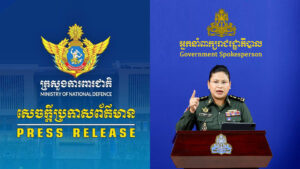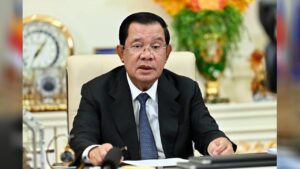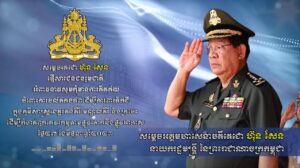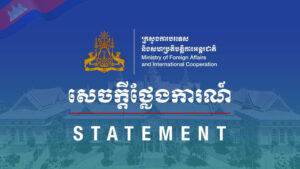Selected Comments Samdech Techo Hun Sen, at the inauguration of the Phnom Penh 52-kilometer third ring/belt road [Unofficial Translation]
![Selected Comments Samdech Techo Hun Sen, at the inauguration of the Phnom Penh 52-kilometer third ring/belt road [Unofficial Translation]](https://grandnewsasia.com/app/uploads/2023/08/230803-PM-3rd-Ring-Road.jpg) Selected Comments Samdech Techo Hun Sen, at the inauguration of the Phnom Penh 52-kilometer third ring/belt road [Unofficial Translation]
Selected Comments Samdech Techo Hun Sen, at the inauguration of the Phnom Penh 52-kilometer third ring/belt road [Unofficial Translation]
(1) Led by the Cambodian People’s Party, Khmers can accomplish the people’s need
[…] I commend the authorities of Phnom Penh and Kandal for their efforts to cooperate with the Ministry of Public Works and Transport, as well as with the (Shanghai Construction Group Co., Ltd.) company, to implement this great project, which is considered an ambitious one, but we Khmers can do it. The CPP-led Cambodians can accomplish whatever the people want. I thank the people who helped solve the problem of accepting compensation as well as agreed to sell the land when we had to run the road through and have to buy the land in its entirety […]
(2) From now on the new Prime Minister to function in future ceremonies
[…] In Siem Reap, through the investment of a Chinese company, in this October month, we have planned for the planes to land at the new airport. Let us leave the event for the new Prime Minister to inaugurate […] I already visited it […] let me take a moment to say that today is the last time that Hun Sen speaks as Prime Minister. However, Hun Sen has not gone anywhere yet. Hun Sen still controls the political situation in Cambodia. I will talk about why Hun Sen had to leave the Prime Minister post […] I will tell you the reasons […] His Excellency Wang Wentian has contributed a lot over the years to travel with me to launch the groundbreaking and inauguration ceremonies. For the (future ceremonies), (HE Wang Wentian) will have to join with the new Prime Minister. This is It is a normal state process […]
(3) Voters make up 84.59% of the registered number, valid ballots are 94.64%
[…] I apologize to His Excellency Wang Wentian that I need to send a message and an explanation to the people regarding my departure from the post of Prime Minister by August 22 […] First of all, I would like to thank the people who, up to 84.59 percent, went to the polls. Compared to the national elections in 2018, when we have only 83.02 percent of the registered voters went to the polls, it is an increase. In the last 2022 commune elections, we had only 80.32 percent turnout […], in the 2023 national elections, there are more than 7.7 million valid ballots, equivalent to 94.64% of the cast ballots (and the invalid) ballots are 5.36 percent, compared to 2018, there were more than 8 percent of invalid ballots […]
(4) The 2023 general election is a contest between supporters and destroyers of democracy
[…] on this point, I would like to share with you that the election in Cambodia has two characteristics. The first is the race for seats in parliament (where the competition) takes place in a relatively calm environment. But what is the real competition (secondly) is between the supporters of the election and democracy through elections, and on the other hand, the destroyers of democracy by preventing people from going to the polls, making marks that invalidated the ballot, or in short, destroying the election […]
(5) There is sufficient evidence that a political party was involved in the invalidation of the ballot
[…] We have found some targets […] should this party be dissolved or not? If the boss of this party raises his hand to stab us, we will not be afraid to cut off the roots and throw them away. (There must be a) bargain at that point. You are doing things illegally. Some have confessed and obviously there had been this “Sabai” telegram group. There had been those who photographed and posted them (the crossed-out ballots). We have enough evidence that a political party is involved and that party is placing lawyers (to defend) those who had done that. Is this a proof? […]
(6) The international community of 65 countries/nationalities declares the legitimacy of the election in Cambodia
[…] It may be wise for certain countries to not force us to go to the level that we have to make decisions. We just urge you to respect Cambodia’s independence and sovereignty, recognize the will of more than 84% of the (registered voters) […] if you impose the view of the minority on us, we will not reserve understanding for the minority voice here […] the election results are clear and […] “in Cambodia, there are no early elections,” I told observers from more than 65 countries or nationalities. What do these 65 nationalities represent when they come to Cambodia? Is this called the international community or not? Or would one or two countries, or 3 is the international community? [..] One country or two countries do not present an international community. That is not right […]
(7) “Democracy in Cambodia has won”
[…] Dissatisfaction is your thing. Let the people who are satisfied enjoy their rights to be satisfied and do not consider one or two or three countries as the international community. The international community is something like a majority at the UN General Assembly […] when it comes to the internal affairs of a country, there is no interference. I can finally declare that democracy in Cambodia has won. We hold regular elections, in which the prime minister has no right to dissolve parliament. The constitution clearly states that the parliament has a five-year term […]
(8) Sacrificing again for the long-term peace of the nation/people …
Now, let’s ask why I have to leave the post of Prime Minister when the party has received such high support? I can say that this is a sacrifice for long-term peace, to ensure peace and to ensure development. I have already sacrificed many times. I used to take trade life to liberate the country. I traded my life to unite the country, and end the protracted war, and I used my political life as the capital for political and economic reforms in Cambodia. Now I am sacrificing once again for the long-term peace of the people. There are at least four reasons that I should tell people why I have to leave now. That we are transferring (leadership) to the youth now is (because it is) more stable and safer than (doing it only) when we are older or about to die […]
(9) How many rulers in Cambodia before have given up power?
[…] How many people in Cambodia in the past have ever relinquished power like what I am doing now, while I am still able to be prime minister for another five or 10 years. It is not good (that we hold office) until we are too old or about to die. “Who is going to take over after Hun Sen?” was a question that arose from 2015/2016, when I went to Tokyo. The late former Prime Minister Shinzo Abe, while sitting at the table with me at the Mekong-Japan summit, posed the question, “Who is going to take over after Hun Sen?” There were jokes that “after Hun Sen is Hun Sen.” Indeed, after Hun Sen was Hun Sen. Hun Sen continued from 2018 through to 2023 […]
(10) The conditions and qualifications are favorable for the new government to begin
[…] the transfer of leadership to the youth to start now is a good thing (as it is) ensuring that we are all happy (in the state) that the older groups, along with the younger ones, continue to maintain peacefully for peace and development […] Previously, there were two scenarios. Firstly, the old group would continue to lead the government for a year or two and then leave, and hand it over to the next generation. Secondly, we let them start from the beginning of the term. Judging by the conditions and qualifications, as well as the favorable situation, the Standing Committee (of the Cambodian People’s Party) decided to choose the second scenario that the new government should start from the beginning without the need for a transition by the old one. In this way, we give full power to successors to be able to do their work throughout the term. This is the biggest guarantee that there will be no crisis (of transfer of leadership) […]
(11) The next generation is well prepared to take over the long journey
[…] The second point is that (the next generation) has presented themselves to lead (the country) when they have been well prepared. They come to take from us – the older generation – the burdens for the long run and they are no longer young. Compared to me, when I took over the post of Prime Minister, […] I was only 32 years old. The new prime minister is now 46 years old, which means he is 14 years older than I was […] (he) has had enough training and exposure. We have already included some of them in the government for a long time. A group of young people or we called them the younger group (members of the government), has long been included as Deputy Prime Minister and Ministers […]
(12) President of the Supreme Council of the Throne … President of the Senate
[…] I am willing to sacrifice this power for the long-term happiness of the Cambodian people, including us. Some of the elected officials, who in the previous government had been Deputy Prime Ministers, senior ministers and ministers, will now be members of the National Assembly, the senators, and some as advisors to the Royal Government. I have confirmed the day before that in the coming days HM the King will appoint me as the President of the Supreme Council of the Throne, which has been left vacant after the death of Samdech Krom Preah. Samdech Sar Kheng, Samdech Tea Banh, Samdech Heng Samrin, Samdech Men Sam An will all be appointed as Supreme Advisers to HM the King […] there have been demands in the Party that I should not leave too far from the state affairs. On this note, I will go to the position of President of the Senate after the Senate election on February 25, 2024 […] I resign from the National Assembly member of Kandal Constituency but I will stand as a member of the Kandal Constituency senators […]
(13) The first phase of the five-angles strategy prioritizes people, water, roads, electricity and technology
[…] I can say that the next generation is ready […] we have started from the triangular strategy to the four-phase rectangular strategy, and now we switch to the pentagon or five angles strategy – adding another angle to the previous motto – job; growth; equity; efficiency; and now one more – sustainability – the fifth angle. In terms of policy, the priority for development is people, water, roads, electricity and technology. The situation has evolved and we cannot stay in the rectangular strategy as before. Capturing technology along with training of human resources is the goal, and it is the main task for the development of the country. Nearly half of the new government members hold Ph D degrees […]
(14) The former generation has not left politics but does not influence the decisions of the Royal Government
[…] Thirdly, I want to emphasize that the older generation has not left politics. I am still (leading) the ruling party, accompanied by four vice presidents, along with several other members of the Politburo, as some will be serving in the National Assembly and some in the Senate. But I would like to emphasize here that we are not trying to influence the decisions of the Prime Minister, the ministers of the institutions. In general, we do not try to influence the decisions of the Royal Government […]
(15) It is time to transfer the position to the next generation … two layers of belts
[…] Even though I do not have children, I must use this (appropriate) time to transfer power and transfer positions to the next generation, not just for my children. As long as they meet all the conditions and get the support of the party and the support of the people, that is enough. No matter what you talk about passing on to the succeeding generation, the dynasty, etc. The Constitution does not prohibit my son’s right to serve as prime minister, or even if Manet were not my son, it was a stage that commanded transfer (of leadership). We have come to old age. We must leave the jobs to the younger generation with our presence. It would be hard. There would be two layers of belts. We have a backup tire […]
(16) If the new Prime Minister had life threatening accident, I must return to be the Prime Minister for a while
[…] Let me warn you on one thing. If my son (who is going to become Prime Minister) is having life threatening accident of some kind, the possibility is that I must return to be the PM. Let me be clear. I do not want this country to be in turmoil. If Hun Manet met accident/mishap, I must return to be the Prime Minister for a while. After that, I will choose the one who can be the next prime minister. I have informed the Standing Committee since December 2021 that “if Hun Manet met life threatening accident, I must return to be prime minister.” This is necessary to ensure the well-being of the people […]
(17) Situation are favorable in all respects … the ballot confirms a combination of 3 actors
[…] The fourth point is related to the situation. The situation in all areas favors the succeeding team to start their journey. Previously, I still had a backup plan. If the vote (that supported the Cambodian People’s Party) was below 74%, I would continue (holding the PM post) because it means that people has not yet supported Manet […] I would continue to improve the situation first. However, this ballots clearly show the combination of 3 actors – first, the party, second, Hun Sen and third, Hun Manet himself […]
(18) Will not prevent the progress and independence of successive government
[…] Today is the time for me to speak as Prime Minister. Next time, if I were to make a statement, I would not deliver my speech this way […] David Huot has written for many newspapers – Cambodia Daily, Khmer Times, Asia Times […] in his latest three articles, he had written objectively about the good things that Hun Sen has done […] it is a good thing that he recognizes the truth. However, David Huot said at one point that “Hun Sen’s presence will slow down Manet.” I would like to confirm to David Huot that “you are wrong on what Hun Sen has thought.” Hun Sen does not have the habit of letting his children lack (independence in decision making) and have to ask his father […]
(19) Saying the wrong thing, evaluating the wrong situation, the profit came to the CPP […] I should send a message to the opposition and some analysts. If you continue to make groundless analysis, you cannot win the CPP. As long as you talked things that are not true, the profit will come from the CPP. You are saying all the time that there is tense internal rift in Phnom Penh between Sar Kheng and Hun Sen about the transfer of power/leadership. Your assessments are too far wrong. It is just that Sar Kheng or Sar Sokha did not respond. The CPP has no habit of arguing […] I thank those who insulted me or insulted my children and my family, because of which the CPP has enjoyed more votes. People are not listening to what you tell. Every day, they see the truth – bridges, roads, schools, hospitals, everything. Life is different from the past, they are not without eyes […]./.






